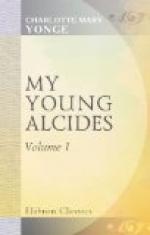I longed to understand more, but I was ashamed to betray my ignorance of my near relations, for I did not even know whether their mothers were alive; but I saw that if I only listened, Eustace would soon tell everything. He had a runaway chin, and his mouth had a look at times that made me doubt whether there were not some slight want in his intellect, or at least weakness of character. However, I was relieved from the fear of the vice with which the neighbourhood had threatened us, for neither of them would touch wine or beer, but begged for tea, and drank oceans of it.
We had not long finished, when Richardson brought me a note from Lady Diana Tracy, saying she had sent the carriage for me that I might at once take refuge from this unforeseen invasion.
I felt it out of all possibility that I should thus run away, and yet I knew I owed an apology for Harold’s finding me and the old servants in possession, so I began to say that my old friend had sent the carriage for me.—I had been taken by surprise, their journey (one of the first across the Isthmus) had been so much quicker than I had expected, or I should have left the house free for them.
“Why?” asked Harold. And when I answered that the place was his and I had no business there, he did not seem to see it. “It is your home,” he said; “you have always lived here.”
I began explaining that this was no reason at all; but he would not hear of my going away, and declared that it was I who belonged to the place, so that I confessed that I should be very thankful to stay a little while.
“Not only a little while,” he said; “it is your home as much as ever, and the best thing in the world for us.”
“Yes, yes,” responded Eustace; “we kept on wondering what Aunt Lucy would be like, and never thought she could be such a nice young lady.”
“Not realising that your aunt is younger than yourselves,” I said.
“No,” said Eustace, “the old folk never would talk of home—my father did not like it, you see—and Aunt Alice had moved off to New Zealand, so that we could not go and talk about it to her. Mr. Smith has got a school in Auckland, you know.”
I did not know, but I found that a year or two after the death of my brother Ambrose, his widow had become the second wife of the master of a boarding-school at Sydney, and that it was there that Harold, at ten years old, had fought all the boys, including the step-children, and had been so audacious and uncontrollable, that she had been forced to return him to his uncle and aunt in the “Bush.” Eustace had been with the Smiths at Sydney until her move to Auckland, he had even been presented, and had been to a ball at Government House, and thus was viewed as the polished member of the family, though, if he had come as master, I should never have been drawn, as I was by Harold’s free, kindly simplicity, into writing my thanks to Lady Diana, and saying that I could not leave my nephews so abruptly, especially as they had brought a little sister.




